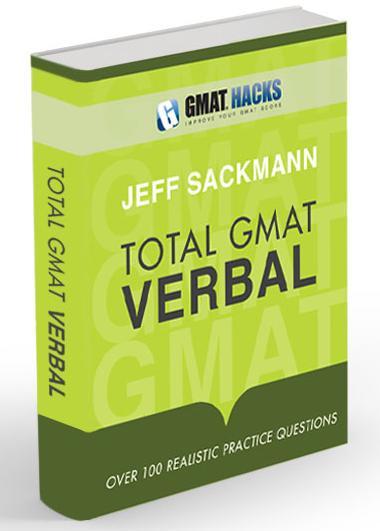
Bookshelf
|
|
Total GMAT Math Jeff's complete Quant guide, on sale now! |
|
|
Total GMAT Verbal Everything you need to ace GMAT Verbal! |
1,800 Practice Math Questions
Buy Jeff's books at Amazon.com

GMAT Official Guide, with IR
OG Math | OG Verbal
OG12 & Quant Rev solutions!
GMAT Question of the Day
Beginner's Guide to the GMAT
GMAT Hacks Affiliate Program

Best of GMAT Hacks

Categories
- General Study Tips
- Goals and Planning
- CAT Strategy
- The Mental Game
- GMAT Math Strategy
- GMAT Math Topics
- Mental Math
- Data Sufficiency
- Critical Reasoning
- Reading Comprehension
- Sentence Correction
- Analytical Writing Assessment
- Business School Admissions
- GMAT Prep Resources
- Practice Questions
- Total GMAT Math
- Total GMAT Verbal

GMAT Question of the Day
February 25, 2014
Every weekday, GMAT Hacks publishes a realistic GMAT practice question. In general, you'll see Quant problems on Monday, Wednesday, and Friday, and Verbal questions on Tuesday and Thursday. You'll always be able to find them at www.gmathacks.com/daily.
Give today's question a try, and check your answer. When you're done, be sure to subscribe so that you can keep practicing every day!
Today's Practice GMAT Question:
|
A small percentage of dogs are believed to be able to detect the onset of seizures in their owners. A dog with this ability will display characteristic behaviors, such as staring intently at its owner, just before a seizure occurs. Observations of epilepsy patients do not reveal any noticeable change in odor, behavior, or appearance before a seizure. However, seizure-detecting dogs can predict a seizure even when the patient is in another room. If the statements above are true, which of the following is most strongly supported by them? |
|
| (A) | Seizure-detecting dogs are not appreciably more accurate in predicting seizures when they are in the room with a patient than when they are in another room. |
| (B) | No dogs are able to detect the onset of a heart attack in their owners. |
| (C) | Some dogs must be able to recognize a change in odor that medical science has not yet identified. |
| (D) | Seizure-detecting dogs do not rely on visual information to predict a seizure. |
| (E) | When a seizure-detecting dog stares intently at its owner, the owner is likely to have a seizure. |
Click to show answer (opens in new window)
Need more work in this area? In Total GMAT Verbal, there is an entire chapter, including practice problems, that covers Inference.
If you don't already subscribe to the GMAT Question of the Day, start now--it's easy! A new question is published every weekday. You can sign up for all the questions, or just Verbal or Quantitative questions. Click here to subscribe!
About the author: Jeff Sackmann has written many GMAT preparation books, including the popular Total GMAT Math, Total GMAT Verbal, and GMAT 111. He has also created explanations for problems in The Official Guide, as well as 1,800 practice GMAT math questions.
- Previous GMAT Question of the Day
- Question of the Day Archive
- Articles on Critical Reasoning
- Search GMAT Hacks
 |
Total GMAT Verbal
The comprehensive guide to the GMAT Verbal section. Recognize, dissect, and master every question type
you'll face on the test. Everything you need, all in one place, including 100+ realistic practice questions. |